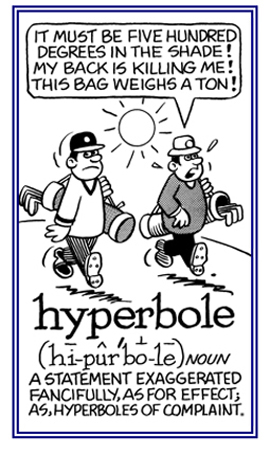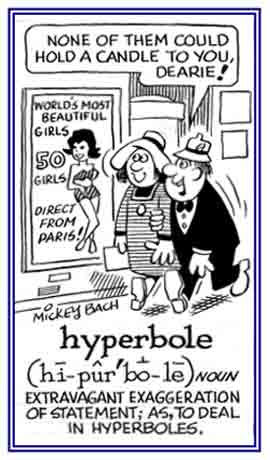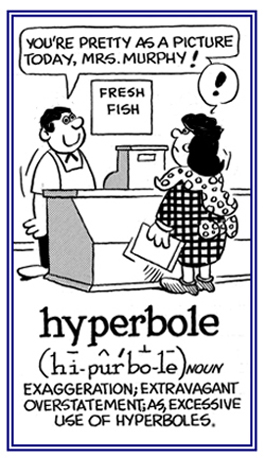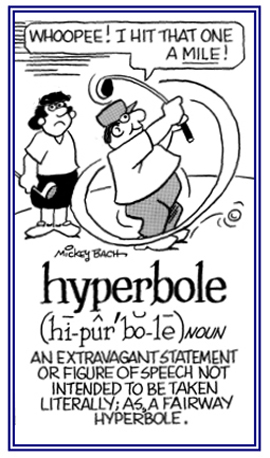hyper-, hyp-
(Greek: above, over; excessive; more than normal; abnormal excess [in medicine]; abnormally great or powerful sensation [in physical or pathological terms]; highest [in chemical compounds])
2. A program of parenteral administration of all nutrients for patients with gastrointestinal dysfunction: Hyperalimentation is also called total parenteral alimentation (TPA) and total parenteral nutrition (TPN).
Although the term hyperalimentation is commonly used to designate total or supplemental nutrition by intravenous feedings, it is not technically correct inasmuch as the procedure does not involve an "abnormally increased or excessive amount of feeding".
It is sometimes followed by forcing oneself to vomit, or purging through use of laxatives.
2. An excessive motor activity of a body part; such as, a to-and-fro movement.
2. Relating to, involving, or occurring at pressures higher than normal; such as, being greater than atmospheric pressure.
2. A condition resulting from exposure to ambient gas pressure, or atmospheric pressures, exceeding the pressures within the body.
A sufficient elevation will produce jaundice. Some degree of hyperbilirubinemia is very common in babies right after birth, especially premies.
A cone is an object or shape that has a circular base and tapers to a point at the top, or has a circular top and tapers to a point at the bottom.
2. A plane curve having two branches, formed by the intersection of a plane with both halves of a right circular cone at an angle parallel to the axis of the cone.It is the locus of points for which the difference of the distances from two given points is a constant.
2. A figure of speech in which exaggeration is used for emphasis or effect: Examples of hyperbole are illustrated by the following statements:
I'm so tired, I could sleep for a year.
This book weighs a ton.
I could eat a million of these cookies.
It is taking an eternity to finish the research!
It might be a hyperbole to describe the hyperbola as reaching to the moon instead of just stating that is was large and graceful.
2. Something that is not to be taken literally; a figure of speech, or a distortion of what is real that is used for emphasis or special effects: Here are a few examples of hyperboles: Thanks a million; Stubborn as a mule; Strong as an ox; Big as a whale.




Go to this Word A Day Revisited Index
so you can see more of Mickey Bach's cartoons.

Go to this Word A Day Revisited Index
so you can see more of Mickey Bach's cartoons.
Related "above, over, beyond the normal, excessive" word units: epi-; super-, supra-, sur; ultra-, ult-.
Inter-related cross references, directly or indirectly, involving word units meaning "more, plentiful, fullness, excessive, over flowing": copi-; exuber-; multi-; opulen-; ple-; pleio-; plethor-; poly-; super-; total-; ultra-; undu-.


